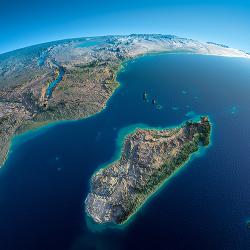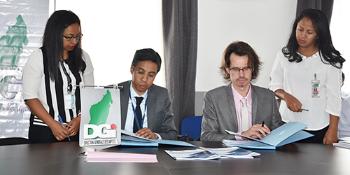UNDP Madagascar
Reinforcing Tax Inspections in Madagascar with a View to Improving Domestic Resource Mobilisation for Financing Development
By Amelie Voninirina, Co-ordinator of the Budget Management programme for inclusive growth and meeting MDG/SDG, and El Hadji Fall, UNDP Economic Advisor in Madagascar
21 April 2020
 |
With its Plan Emergence Madagascar (PEM) for 2019-2023, Madagascar has set out its ambition to place the country on the path of emergence between now and 2030, and to achieve the Sustainable Development Goals (SDG). The planned transformational changes call for the implementation of large structural investments that will require the mobilisation of significant resources. In order to remedy the volatility of external aid, the government is counting on domestic resource mobilisation to execute the PEM project. The Malagasy government wants to increase the tax burden from 11.9% to 15% by 2023 through a 26.2% annual average increase in domestic tax revenues, and a 15.9% increase in customs revenues.
Nevertheless, the current shortcomings in the tax administration’s capacities make it impossible to reach Madagascar’s tax potential, which the IMF estimates at 15 to 17% of GDP[1]. Indeed, in 2017, Madagascar’s tax/GDP ratio, at 11.9%, was 5.3 percentage points lower than the average of 26 African countries (17.2%), and also lower than the average for Latin America and the Caribbean (22.8%). Between 2008 and 2017, Madagascar’s tax/GDP ratio fell by 1.1 percentage points, from 13 % to 11.9%.[2]
|
|
Accordingly, UNDP Madagascar, as part of its contribution to achieving the SDGs, is supporting domestic resource mobilisation through a programme of activities for the tax administration. This support programme includes capacity building to improve tax revenue projections, tax-addressing systems at the level of the regions, contributing to the digitisation of the tax system, and capacity building in transfer pricing audits, etc.
Within the framework of this collaboration between UNDP and the Malagasy tax administration, the latter asked for help from UNDP Madagascar in organising a Tax Inspectors Without Borders (TIWB) programme in Madagascar to strengthen capacities as part of the mission to mobilise domestic resources to finance the government’s development actions.
With the facilitation of the UNDP’s TIWB team in New York, the Malagasy tax administration and UNDP Madagascar were put in contact with the TIWB Secretariat, run by UNDP-OECD as a joint initiative. Three-way discussions between UNDP Madagascar, the Malagasy tax administration and the TIWB Secretariat led to the signing, in October 2019, of terms of reference outlining the practical conditions for the execution of an 18-month TIWB Programme. |
|
The French General Directorate of Public Finance (DGFiP), as the partner administration in Madagascar’s TIWB programme, provided Madagascar's Directorate General for Taxation with an expert in transfer pricing audits whose mission is to train officials in the tax audit service. UNDP Madagascar, as the financial partner in Madagascar’s TIWB programme, is responsible for covering the financial costs of the TIWB expert’s missions to Madagascar.
UNDP Madagascar, as the financial partner in Madagascar’s TIWB programme, is responsible for covering the financial costs of the TIWB expert’s missions to Madagascar.
The TIWB programme, through its learning by doing approach, contributes to the objective of creating, within Madagascar's Directorate General for Taxation, a team of auditors with special audits skills and techniques who will no doubt help improve the capacity to increase domestic resources. |
Mr Mihamintsoa Hasina Rakotondrainibe, Technical Director of Madagascar's Directorate General for Taxation (centre left), and French TIWB expert (centre right) |
|
In November 2019, the TIWB expert visited Antananarivo on an initial scoping mission during which he was able to meet all the stakeholders in the TIWB programme and start work on audits. |
[1] World Bank “Systematic Country Diagnostic”, 2015
[2] Revenue Statistics in Africa 2019
» Return to Reports & Case Studies
Related Documents


